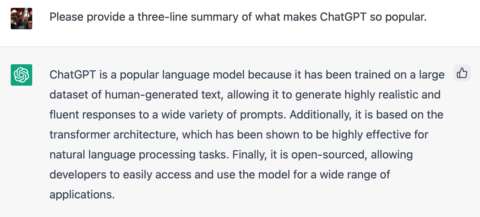It’s been hard to avoid the rise of ChatGPT these past few months. A chatbot that produces written work from a conversational prompt, it can do everything from explaining quantum physics to drafting a polite email to your boss.
Whatever your views on AI-generated content, this impressive conversational construct has become incredibly popular – which makes great fodder for scammers.
One such scam app has just been removed from the App Store, having shot to the top of the rankings in its guise as a ChatGPT app charging hefty in-app purchases for access.
In reality, ChatGPT doesn’t have an app, and it doesn’t charge for access either. It’s available via the ChatGPT website, and it’s free to use during the current “research preview” – essentially an open beta test. You’ll need to sign up for a free OpenAI account, and be careful not to share any sensitive information, but that’s it.
Though Apple does its best to filter out fake apps, it’s best to be vigilant for those that can slip through the cracks. Make sure to check the App Store reviews, and pay attention to any prompts that appear when you launch the app. Viral hits like this are inevitably copied for a quick buck – it happened with the huge success of Wordle this time last year, with ad-filled clones plaguing the App Store.
If you’re curious about what it can do, let’s round out this article with a few words from ChatGPT itself. We asked it what it thought of these recent fakes:
“Scam apps that pretend to be me or other legitimate AI-based services can be harmful to individuals and damage the reputation of the true AI service. If you come across a suspicious app claiming to be me or any other AI-based service, it’s best to exercise caution and verify the authenticity of the app before downloading or using it.”
Wise words indeed.


